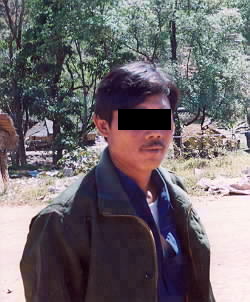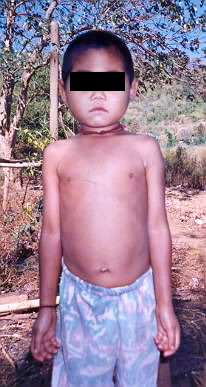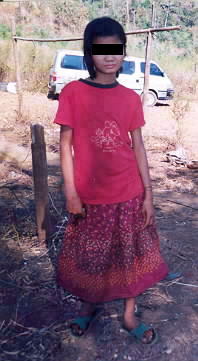Stories from Dooplaya District, Karen State, Burma, March 2003, by Saw Takkaw

1. WHAT HAPPENED TO
MY WORLD? THE STRUGGLES OF AN IDP FATHER
Stories from Dooplaya District, Karen State, Burma, March 2003, by Saw Takkaw
When this Karen man, Saw
O, was asked about the needs of his family and IDP group, he shifted his weight
from foot to foot and looked around nervously. The interpreter then explained
that we were trying to organize support for his IDP group, but still the man
was unresponsive. The interpreter tactfully pushed on until the man stated emphatically,
“Rice. Yes, we need rice. But even if we have rice we do not have enough
pots to cook it in. Also, we need mosquito nets and blankets, but rice first.
OK, look – we cannot even feed our own children. I do not like to say such
things – I am a man, but I cannot even feed my children.”
The deprivation that Saw O’s children are facing is no fault of his own
but that of the Burmese military dictatorship (SPDC). Because of the SPDC’s
policy of persecution against ethnic minority civilians, thousands of families
have to make the choice either to stay in areas under Burmese Army control and
face possible abuse, or run and face certain deprivation. Saw O and his family
are terrified of the Burmese Army, so they chose to run. Their exodus has lasted
for over fifteen years and has claimed the lives of two of his children (both
perished from malaria). But Saw O is a dignified man, and he does not want to
be seen as a victim; he just wants to feed his family. He would rather live
in peace, and farm the land as his Karen ancestors have done for centuries.
The situation in which he and his family must exist is totally beyond his control.
But this fact does not still Saw O’s deep sense of shame and humiliation,
because he cannot provide for his family’s basic needs.
2. BURMA AT GROUND ZERO: THE BIGGEST VICTIMS ARE THE “SMALLEST”
VICTIMS
During a human rights interview at an IDP site, I was informed about two chronically
sick children in the group (boy age 6, girl age 14). Both of the children were
weak and listless. The girl wept the entire time I was present at the site.
A few days later, with the help of the Karen National Union, the children were
moved to a hospital inside Thailand. The life of an IDP is wrought with danger
and uncertainty. When not in flight from the Burmese Army, IDPs try to eke out
a living in the jungle. IDPs’ capacity to acquire food, water, shelter,
clothing, and medicine is greatly constrained. Maintaining personal hygiene
and taking preventative measures against malaria promote challenges as well.
Under such conditions, children suffer the most. The situation becomes
even more critical for IDP children when one or more of their parents/caregivers
fall prey to illness, injury, or death.
The boy, Saw A, was
malnourished, thalassemic (a genetic blood disorder), and identified with anemia.
Hopefully, his condition will improve, so that he will not need blood transfusions.
The doctor also explained that the boy is permanently stunted.

The girl, Naw M, unfortunately
faces much more serious health challenges. At age 14, Naw M weighs only fifty
pounds. Her small body and stunted growth even shocked the Thai hospital staff
who deal with “border cases” regularly. She is anemic, malnourished,
and has “chronic” malaria. At the time of writing this report, she
was in the hospital and listed in serious condition.

Both of these children have been robbed of a healthy life as a direct result
of SPDC policies. Although children like Saw A and Naw M will never make the
headlines, they represent Burma’s largest and most vulnerable group of
victims, children.
3. “WHEN THE BURMESE ARMY MOVES TO THE LEFT, WE MOVE TO THE RIGHT.”
A portion of a group of 150 Karen IDPs.
Composition of group: 75 women, 50 children, 25 men.
Most of the IDPs in this group have been on the run from the Burmese Army for
four to five years. Some families in the group, however, have been in flight
from their home villages for over ten years. During these years the IDPs have
lived in numerous locations, “When the Burmese Army moves to the left,
we move to the right.” They arrived at this particular site approximately
two years ago after the Burmese Army occupied their previous site. According
to one aid worker, the fact that these IDPs are not “new arrivals”
reduces the chance that they will receive relief from aid organizations.
Maintaining dignity: The desire to be self-sufficient and free from abuse.
Due to this year’s unsuitable weather conditions, the group’s attempts
at farming failed. With sick and malnourished children already among them and
Burmese troops only a few kilometers away, the future looks bleak. The site
where they now live is located behind a string of hill outposts manned by lightly
armed KNLA soldiers (Karen National Liberation Army – the resistance forces
of the Karen National Union). But they would rather endure the hardships associated
with being an IDP, than submit to SPDC rule. It is indeed a tragedy when
parents have to make a choice between raising their children under a dictatorship
where they may have to endure various abuses (including rape, forced labor,
and murder) or live on the run and face certain deprivation. What would you
do?
In order for the fighting in Burma to cease, the military dictatorship must
be dissolved. Only with its dissolution can the safety and prosperity of future
generations of the people of Burma be conceivable.
These KNLA soldiers display their resolve, despite incredible odds and hardships,
to struggle on against the Burmese dictatorship.